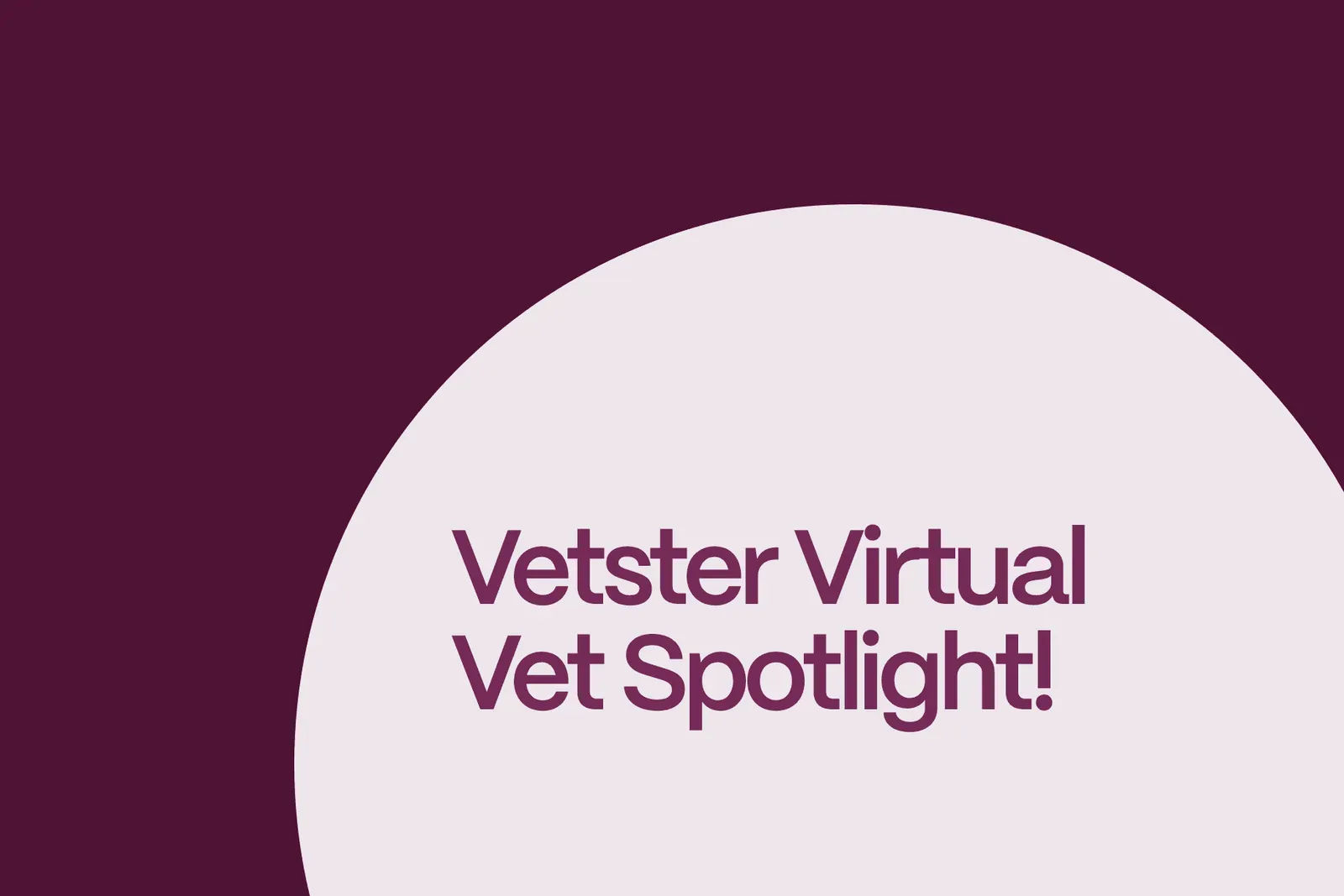Building client trust in nutrition consultations

To successfully grow your virtual nutrition practice on Vetster, trust is essential. Pet owners must feel confident that your recommendations are grounded in veterinary expertise and aligned with their pet’s best interests. With so much conflicting information online, your role as a knowledgeable pet nutrition coach is more important than ever. It’s critical to start by gaining the trust of your clients in order to work together to find nutrition solutions that align with everyone’s priorities - both yours and theirs.
According to the American Animal Hospital Association (AAHA), “More than 70% of pet owners turn to their veterinarian for nutritional advice,” but only a fraction report receiving it proactively. This gap presents an important opportunity for virtual veterinarians to step in with credible, accessible guidance.
Vetster makes this easy by offering a secure, professional platform where you can deliver tailored nutrition guidance, supported by integrated medical records and flexible follow-up scheduling tools.
Follow these steps to build and maintain client trust in your virtual nutrition consultations:
Provide evidence-based advice
Support your recommendations with up-to-date veterinary research, and take the time to explain how specific diets, ingredients, or formulations benefit a pet’s health. Given the amount of conflicting nutrition advice online, clear and science-backed explanations set you apart as a reliable expert. Use examples from peer-reviewed studies or guidelines from reputable organizations such as the World Small Animal Veterinary Association (WSAVA) or AAFCO to strengthen your credibility.
Present your recommendations clearly and confidently
Just as important as what you recommend is how you communicate it. Research shows that pet owners are seven times more likely to follow healthcare advice when it’s presented as a clear, confident recommendation rather than vague or uncertain suggestions. Don’t be afraid to be direct. Clarity builds trust and increases the likelihood of compliance.
Personalize every recommendation
No two pets are alike, so personalize your nutritional recommendations. Tailor your guidance based on a pet’s breed, age, weight, lifestyle, and medical history. Personalized care demonstrates a deep understanding of the individual pet and reinforces that your recommendations are thoughtful and specific.
On Vetster, you can easily access a pet’s medical history through the platform’s integrated records, helping you provide personalized and consistent advice every time you meet with a client.
Address owner concerns with empathy
Nutrition is often a source of confusion, debate, and emotion for pet owners. They want the best for their pets and often have strong convictions about how they will feed them. They also commonly have concerns about the safety of preservatives, the quality of ingredients in commercial foods, or whether raw or home-cooked meals are better for their pets.
Start by listening without judgment. Acknowledge their concerns and gently clarify misconceptions.
“People don’t care how much you know until they know how much you care.”
- Theodore Roosevelt
When you respond with understanding rather than judgment, even to concerns you may find insignificant, you show clients that you genuinely care, which builds the trust needed for them to be open to your expertise. Strive to find solutions together and avoid preaching.
Here’s an example:
Client: “I’ve heard a lot of bad things about commercial pet food. I’m not sure I trust it. Shouldn’t I just cook for my dog so I know what’s in it?”
Veterinarian: “I totally understand where you’re coming from. It’s clear you care a lot about your dog’s health, and with all the conflicting information online, it can be really hard to know what’s best. Home-cooked diets can work well in some cases, but the main concern with homemade diets that I want to help you avoid is the risk of missing important nutrients over time. Let’s walk through the pros and cons of a few different options, including commercial diets and what a safe, balanced homemade diet might look like. That way, you can feel confident you’re making the best choice for your dog with the right information behind it.”
Be transparent about options
Be transparent about the options available for pet owners looking to optimize their pet’s nutrition. Be prepared to discuss a range of dietary solutions at different price points, including maintenance, therapeutic, and well-balanced homemade diets. Advocate for the services offered by board certified veterinary nutritionists when appropriate. Provide pros and cons for each option, helping pet owners feel informed and empowered rather than pressured into a single path.
Transparency empowers pet owners, builds trust, and creates a sense of partnership between you and the pet owner.
Leverage trusted resources
Reinforce your recommendations by sharing links to well-established, trusted nutrition resources, such as:
This not only builds your credibility but also provides clients with tools to continue learning and making informed decisions.
Follow up for long-term success
Nutrition is not a one-time conversation. Schedule follow-ups to assess the pet’s progress, address any new questions, and fine-tune the plan as needed. Consistent communication shows your ongoing investment in the pet’s well-being and gives you opportunities to build lasting relationships and recurring appointments.
Vetster makes it easy to schedule follow-ups and stay in touch with clients at your convenience and maintain continuity of care with secure records, so every virtual interaction builds on the last. We also have an ever-expanding library of client education resources for you to share.
Navigating skepticism around commercial diets
Many pet owners are skeptical of commercial pet foods, often due to concerns about ingredient quality, recalls, or the use of fillers. These concerns are deeply important to them, so be prepared for clients to express strong opinions. Proactively strengthen your communication skills to offer accurate, evidence-based guidance and build trust in these conversations.
It’s important to remember that nutrition basics that seem straightforward to you can feel overwhelming or confusing to them. Because they are not trained in animal nutrition, pet owners often assume that a pet food label provides all the information needed to determine whether a diet is healthy or high-quality. Likewise, they may have difficulty distinguishing credible information from marketing claims or misinformation presented as scientific fact. Share resources on how to read a pet food label to empower owners to make more informed decisions based on facts rather than persuasive messaging. Here’s how to effectively address these concerns:
- Validate their feelings: Let them know it’s normal to have questions, especially in a market saturated with marketing messages and misinformation.
- Educate with facts: Blanket statements like “home-cooked or raw diets are bad,” aren’t just oversimplified and inaccurate, they lead to distrust and shut down the conversation. Instead, explain the specific concerns, such as food safety risks or the potential for nutritional imbalance, while also emphasizing that the most reputable commercial diets are formulated to meet strict standards set by AAFCO under the guidance of a veterinary nutritionist. Explain how to look for an AAFCO statement of nutritional adequacy on the label.
- Coach owners on reading pet food labels: Help owners understand the distinctions between maintenance and therapeutic diets, as well as toppers and supplements vs. complete diets. Explain how effective pet food marketing can blur the lines between diet types, and labels often present information in a way that appears scientific or evidence-based, even when it isn't. Point out how marketing strategies also frequently appeal to emotions, implying that the best way to be a “good owner” is to select a certain type of food. Address these misconceptions with clear, factual explanations to support informed decision-making and build trust.
- Offer alternatives: If clients remain skeptical about commercial diets, recommend consulting a board-certified veterinary nutritionist as a way to ensure they’re getting a well-formulated, safe, complete, and balanced home-cooked or raw diet.
- Invite collaboration: Encourage a two-way dialogue to align your recommendations with the pet owner’s values, goals, and concerns. When clients feel heard and respected, they’re more likely to engage in open conversation and share important details about their pet’s lifestyle, habits, and preferences, which can significantly shape your nutritional plan.
A collaborative approach focused on empowering pet owners with the information they need to make a great decision, builds trust by showing that you’re not just prescribing a one-size-fits-all solution, but working as a partner in their pet’s care. It also creates a sense of shared ownership in the decision-making process, which increases client buy-in and follow-through. When pet owners feel they’ve had a voice in the plan, they’re far more likely to overcome their initial skepticism, and that leads to better outcomes for the pet, which is the ultimate goal.
Final thoughts
Virtual nutrition consultations offer a valuable opportunity to support pet owners in a meaningful way while building a sustainable, client-focused practice. By combining clinical expertise with personalized recommendations and transparent, empathetic communication, you can position yourself as a trusted guide. This is especially true for the topic of nutrition, where misinformation and skepticism are common.
Good communication doesn’t just build trust. It drives results. Studies show that effective communication can lead to a 40% increase in client compliance with veterinary recommendations, reinforcing the value of taking the time to explain the “why” behind your advice.
With regular follow-up, active listening, and evidence-based guidance, your virtual nutrition consultations can make a lasting difference for pets and the people who care for them. Vetster provides the tools and flexibility you need to offer high-quality virtual nutrition care, making it easier to connect with clients, grow your practice, and deliver the kind of personalized service that builds long-term trust.
If you’re ready to expand your virtual services, start by incorporating nutrition into your Vetster consultations. Your clients, and their pets, will thank you for it.



